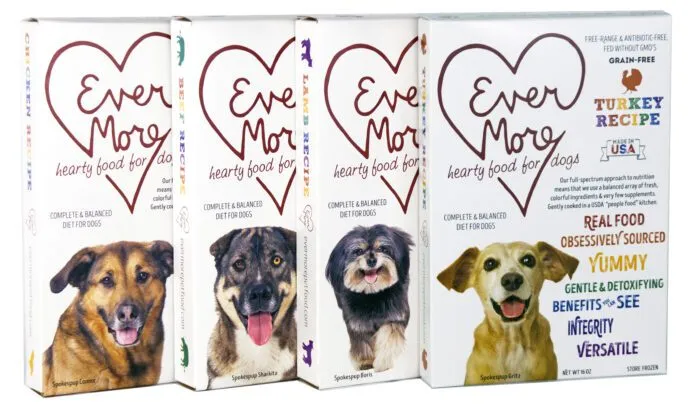I received a press release recently from Evermore Pet Food, who makes one of the foods on our list of the best frozen commercial dog diets. Evermore’s products are are cooked (using a low-heat culinary methods [sous-vide]) in a human-food production facility and contain only “obsessively sourced” human-food ingredients. From the company’s inception, the founders committed to using only the most humanely raised food-source animals in their products.
This commitment was acknowledged last month by an organization called Compassion in World Farming with a “Better Chicken Award,” given in recognition of the company’s as the first commercially prepared food and second overall company in the world* to fully implement the Compassion in World Farming’s “Better Chicken Commitment (BCC).” This standard does more than just requiring chicken farmers to provide the potential for birds to go outdoors (making them “free-range” or “cage-free”); it more fully encompasses the environment the birds live in. This includes the density of the birds in their living area, referred to as “stocking space,” giving them more room to flap their wings and walk comfortably. The BCC calls for an enriched environment, with more light provided than standard “growing barns” provide (conventional factory farms keep the light low, to keep overcrowded birds calm), clean and dry substrate underfoot, as well as giving them roosts and elevated platforms to sleep on. The BCC also addresses the genetics of the chickens—promoting breeds that don’t grow so quickly that they are unable to stand when they reach slaughter weight—and humane slaughter methods.
Having grown up in Petaluma, California, once the “egg capital of the world” (and still home to many chicken and egg producers when I lived there), I have seen factory chicken farms. One of my best friends in high school lived in a rental house that was situated on the property of one of these farms, and not only was the smell and noise of the highly concentrated chickens evidence of the suffering we couldn’t see going on inside the barns, we regularly witnessed farm workers removing the birds that died in the barns before they were mature enough to harvest; their carcasses were horrible to behold, as sick and dying chickens often get attacked and maimed by their peers. The ones that lived didn’t look much better! We’d see them only when they were loaded into trucks (usually at dusk or dawn, when the low light kept them calm), but even these “healthy” birds looked awful, only half-feathered and with skin raw from ammonia burns—a side effect of living their entire but short lives in their own mess.
Anyway, I applaud any efforts made by food producers to buy and use humanely raised meat sources in their products—and wholeheartedly admire companies like Evermore. It’s awesome that they have managed to make a high-quality food for dogs at a price that is not out of line with their competitors, using ingredients that are demonstrably far better than just “cage-free.”
*By the way, Campfire Treats, located in a town not far from me, is the first company in the world to meet all the standards of the BCC. I’ll be checking out their dog treats soon!
Do humane certifications or humane claims influence your buying decisions? Please tell us why or why not!









I too applaud any efforts to improve humane conditions for food animals, even if I have trouble understanding how it can be done in today’s agricultural system at a price point that is affordable to many. And unfortunately 99% of all chicken in pet foods will be living lives like those you observed in your childhood.
Luckily for my dogs, we have a small farm and raise heritage chickens and turkeys, as well as sheep. Our freezers are well stocked for the dogs meals after each season of harvest with meat, organs, bones and broth as well as vegetables from the garden. It’s a lot of work, but our hard working farm dogs deserve good care.
Yes!!! because all living sentient creatures and any animal that is eventually killed, for dog, food is a living sentient creature, and they all deserve to live a life that’s peaceful and healthy!
It’s the right thing to do it. See you main thing to do. I think it makes better food, my dog.
Yes, absolutely. It’s so clearly the only right way for us to move ahead in our evolution. When you know better, you [SHOULD] do better. I’ll be buying Evermore for sure.
Yes!!! I will be looking for this food. Thank you for bringing it to my attention!
it’s great stuff! and they’re lovely to interact with at Evermore.
Yes, it matters very much to me and is one of the deciding factors when I choose food. These animals are giving their lives for us (and our carnivorous animals) to consume. The least we can do (and SHOULD do) is repay them with a good life.
thanks for this. I fed that to my old girl in her last year (she ultimately stopped eating this so we had to feed tinned food – still tried to be mindful but oldies get what they want/need)
Evermore was awesome and they were lovely to work with. a bit pricey but we get what we pay for.
We have to be even more mindful now that the world is stacked against us.
Humane treatment of animals does definitely influence my choices. I literally just purchased some food for our dog’s dinner based on which products indicated third-party certification. I would encourage others to consider checking out the lists that Sue Thixton (at the Truth about Pet Food) makes each year. Indication if a product is uses humanely raised feed animals (and whether that’s backed up with certification) is a feature of her recommended lists. Thank you for sharing your perspective on a valuable topic.